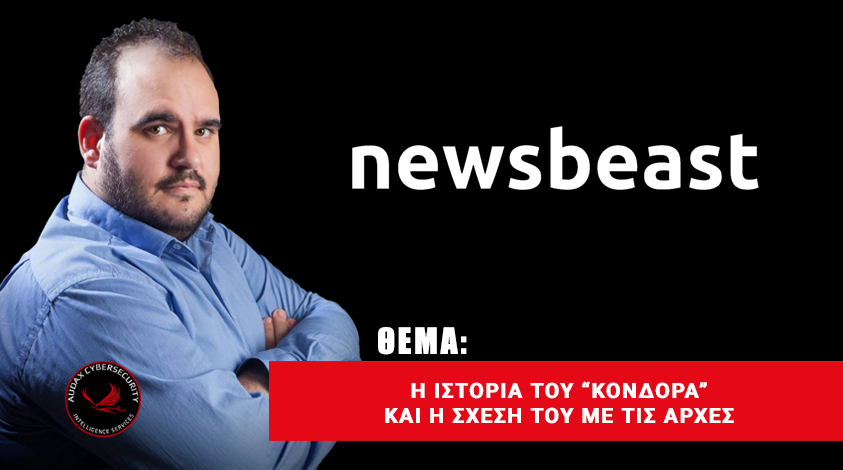The most famous Greek hacker who responded to Turkish attacks during the Ocalan era
Fanis Kasimis talks about his arrest by the Electronic Crime Squad and why the a... appreciated him.
One of the hackers with the strongest reputation on the planet for his actions was Kevin Mitnick. The famous American managed to hack into telecommunication networks and intercept data.
By George Labiris
Photos-Video: Yannis Kemmos
He was sentenced to prison for cybercrimes and possession of forged data, and during his legal adventure he gained supporters, and was considered by many to be the greatest hacker.
Having now returned to legitimacy at the moment, he runs one of the most important cybersecurity companies and frequently delivers speeches on internet security.
Fanis Kasimis was the most important Greek hacker until 2012.
Men of the Cybercrime Squad arrested him on March 1, 2012, a date he is unable to erase from his memory. "Condor", as his nickname was, was operating on the edge of illegality, without any financial gain.
He currently provides his expertise to financial services companies, shipping companies, law firms and other entities of high financial interest.
"With the companies' permission, we hack their systems so that we can identify possible security holes," he says, explaining his current, now legal, activity, before I ask him to tell me about the moment of his arrest...
"So that's when I was in Nafplio with my family," he says as he turns back four and a half years.
"I was working in a marble factory. I remember that two gentlemen appeared and sought me out. One of them asked me: 'Do you have internet at your house? Who is involved?"
"My mother," I replied.
"There's no way your mother is doing what we're investigating. So you can see why we're here," he retorted.
When we arrived at the house, several members of the Cybercrime Division were waiting for me, along with the commander of the Nafplio Security, in the presence of a prosecutor. They confiscated machines and various other things they found. Then they took me to the Nafplio security for a statement, and the next day Manolis Sfakianakis had invited me to his office. So, I set off for Athens to go to the GADA to talk to him personally.
I remember when he opened the door of his office and shook my hand, hugged me and said: "We're not rivals, we're on the same side."
"How can we be in the same camp while you are arresting me?", I wondered.
I spent five hours in his office. He urged me to use my knowledge to open my own company to protect various companies from cybercriminals.
I remember very vividly that I asked him why he had arrested me, when most foreign hackers cooperate with government agencies. For example, the Turkish red hack is directly linked to the Turkish state services. But in Greece, no one ever thought that we could cooperate with the state. In fact, when this possibility was put on the table, the answer was that we could even be convicted for espionage, and how was it possible to discuss cooperation. "
"If I shut down indymedia, Athens will burn"
"Another question I had was why Mr. Sfakianakis arrested me and not the administrators of indymedia, in which a lot is written. All we were doing was defending the internet interests of Greece.
His response was that "If I shut down indymedia, the next day all of Athens will burn down."
"Now that you've arrested me, aren't you afraid that the whole network in Athens might go down in retaliation?", I asked him between serious and funny.
"What he replied was that I had the honey in front of me and I didn't dip my finger in the jar. I never touched a single euro. In fact, there are many reports that when we identified gaps in the banking system, we informed the administrators at a time when all the hackers on the planet are exploiting similar situations to make money. That is, after all, the reason why I'm against you now. If we had stolen money, the attitude towards us would have been completely different. In justifying my arrest, he even mentioned, among other things, that we had become very arrogant lately. We had the power and knowledge to bend any information system," says Fanis.
He and his team never sought to make money using hacking as a weapon.
"We started to set up our group as a group of friends and not as a terrorist organisation as some people tried to accuse us of. We are not thinking of doing anything illegal. In fact, consider that the assessments at the time indicated that we were a well-organized group of criminals with a leader, deputy leader and executive members."
Responding to the attacks of foreign countries and especially Turkey
"But in any case, at the time we started, the Ocalan case was going on. Various hackers from neighbouring countries had hacked into Greek websites. We wanted to defend ourselves and respond to their attacks. So we developed our action. We did not destroy, we did not take money, because that was not our purpose. What we wanted to find out was mainly whether we could cope and respond to the challenges."
"The most common attacks at that time targeted government websites, as well as large news websites and large corporations. I remember that they had hacked into the Ministry of Foreign Affairs, promoting a message from the Turkish Red Hack group."
"All we cared about was building our reputation. It was purely a display of power and knowledge. Imagine not using the maximum amount of encryption and protection we could. We didn't think we were doing anything wrong. Some people tried to get us to join political parties. Many said we were the long arm of the Golden Dawn. Yet we never identified ourselves with parties. We did not want, nor do we want to have anything to do with them.
The beginning of the route and the first Amstrad
Describing the beginning of the journey, he says that ever since he can remember myself... he has been interacting with computers.
"My father at 13 had brought me an Amstrad CPC 474 with a cassette, which had Basic One as its only programming language. Since games didn't cover me at the time, I wanted to develop my knowledge. What I was looking for was to instruct the computer and it would execute on my behalf."
"I read and stayed up late. I got into programming, later the internet came into our lives and gradually I met some people who were also into programming. Over time we ended up doing what is called hacking. I remember that there had been some hits in America at that time, which affected us. But we were particularly impressed by the fact that some people got into the US Department of Commerce, at a time when in Greece we were still in the cable era and had no idea about hacking."
"We liked all of it. Gradually our curiosity pushed us to find out what hacking was. Was there a pill? Some special knowledge that we could receive at the same moment and become a powerful hacker the very next day?", describes Fanis Kasimis.
Asking him for more information about the darknet, the space that hosts websites with encrypted content and illegal activities, he explains that all transactions are made with bitcoin, ensuring complete anonymity in online transactions.
As a trend that has been particularly pronounced on the darknet lately, Fanis presents Tor, which as he says in the following video has become a big deal, without being something new, as many people believe.
The network created by the US Navy
"It is an underground network. It has nothing to do with the open internet that we all know, but a network created by the US Navy during the Cold War for the purpose of exchanging encrypted conversations between America's armed forces," he explains.
Tor and Escobar's action
It is said that this network - in its original form - was hacked by people who had dealings with Pablo Escobar's group and the Colombian drug cartel, which was sending large quantities of cocaine to America, in order to allow drug traffickers to communicate with each other in encrypted form.
"In any case, the US intelligence agencies have now trapped Tor nodes in order to counter cyber attacks and cyber crime", notes Fanis Kasimis.
Drugs, weapons and death contracts over the internet
"One of Tor's famous online stores was Silkroad, which sold drugs and weapons, new or used, among other things. However, this site no longer exists, as it was taken down by the FBI.
He points out that the pages on the darknet are like the Hydra. "No matter how many heads are cut off, many more will be born."
"In essence, Tor gives the space for criminal activities to hackers who sell illegal services and get paid in the electronic currency Bitcoin. Through Tor, human organs, weapons and fake IDs or stolen credit cards can be obtained, as well as stolen cars. Even death contracts are fulfilled through Tor," explains Fanis Kasimis in the video below.

